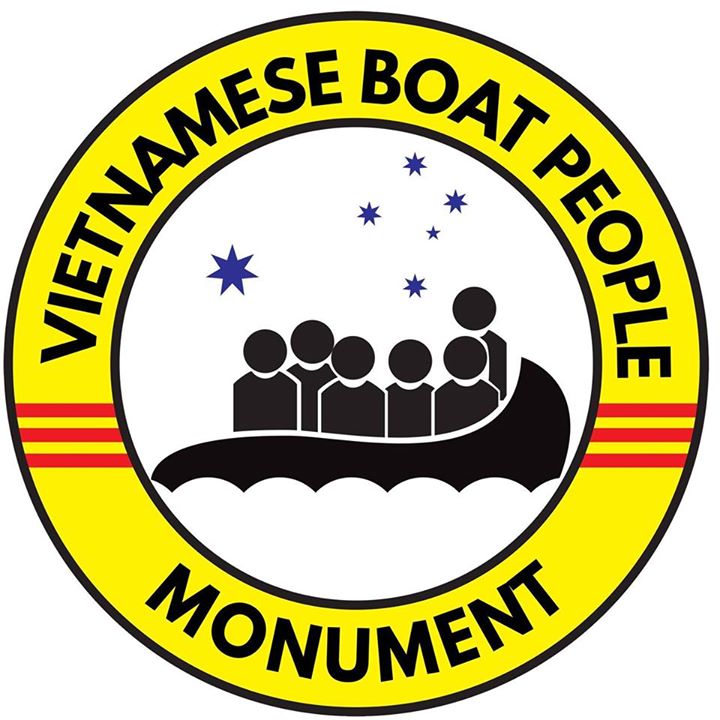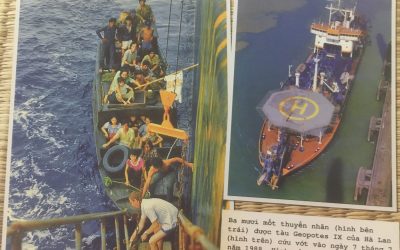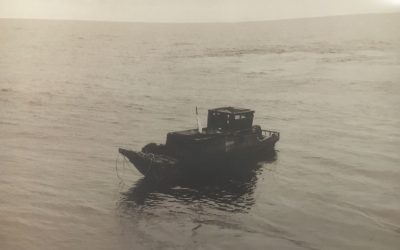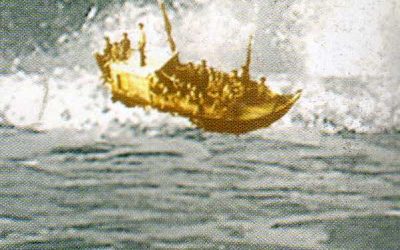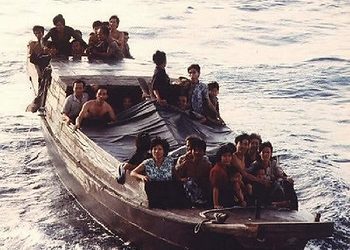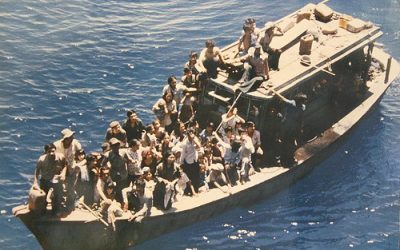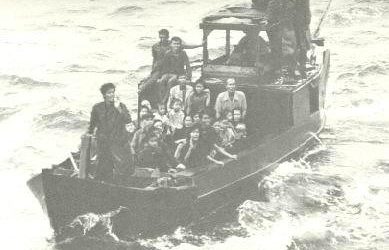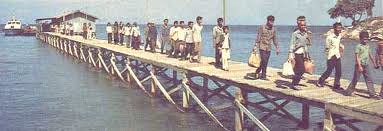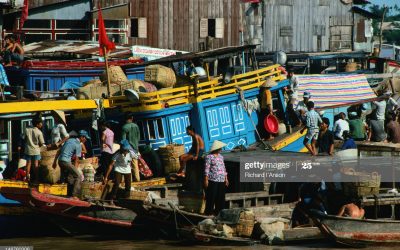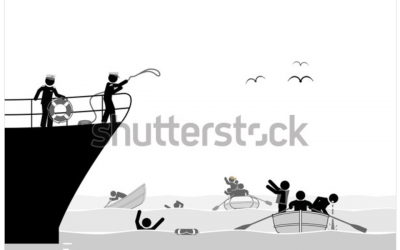A Cluster of Pickerel Weeds
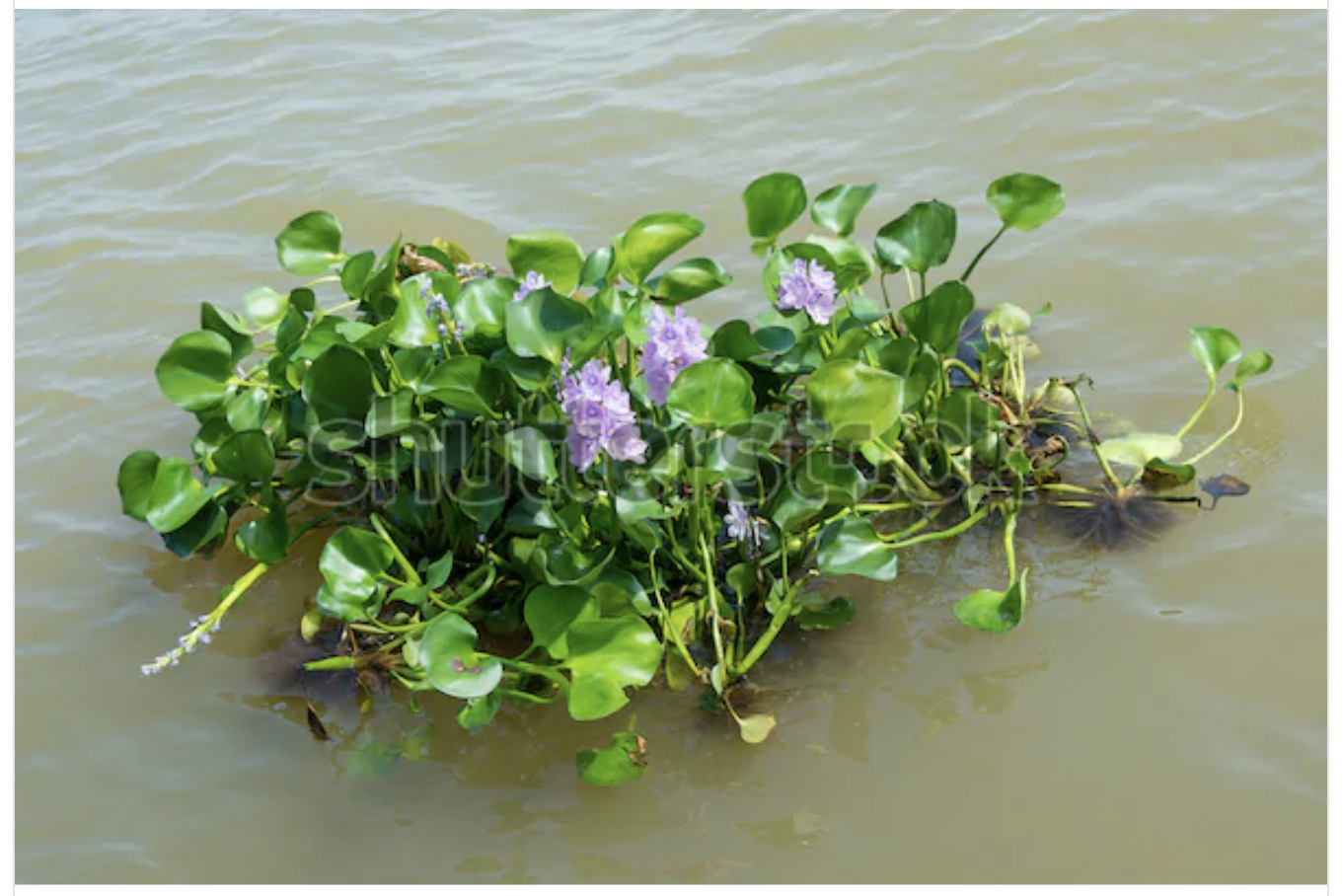
By: Vinh Van Le
I closed the door of my room. With one hand, I held onto the wooden rail at the top of the stairs. I stood there for a little while, intending to go down to say goodbye to my father. I planned to leave my country by a secret sea trip but I could not get rid of the image of my newlywed wife, curled up on the bed. She was nearly seven months pregnant and her swollen belly was clearly visible beneath her nightgown. I reflected on the days we had spent together since our wedding. Our wedding day was quietly and simply organized within our family, after many tiring days caused by the hectic inventory and money exchange practices imposed by the authorities. Outside, night had fallen. I stood in front of the door, my mind wandering. Finally, I made a decision – I opened the door and stepped back into our bedroom.
My wife got up, calling out, “Who’s that?”
“It’s me,” I answered quietly. “I can’t leave you to go on this trip!”
My wife hugged me quickly, without saying a word. She didn’t show her emotions at all.
“Let me go down and tell Dad about the change of plans,” I whispered to my wife.
From our bedroom on the third floor, I walked slowly down the stairs. The neon lights shone through the iron bars of the banister, casting shadows on the concrete steps. It felt so different to other times – this time, I felt that the light was weak and pale. From the stairs, I saw my father who was already sitting on his chair in the living room, his arms wrapped around his knees.
“I’m not going, Daddy!”
My father laughed loudly, his face cheerful.
“I was just waiting for you to say that!” he said.
“My wife will be so sad and worried if I go alone. That would affect the baby badly,” I explained to my father.
“If you did go, I would also be worried! Who knows what will happen to the baby?” my father said. He reached out and poured tea into his cup. His face seemed a little bit fresher but it still did not hide his anxiety about those difficult days.
*
Two days later, when it was still early dawn, my brother, nieces, nephews and sister-in-law were gathered together in front of my parents’ garage. They had been part of a failed escape – the trip which I had intended to be a part of! I looked at them without saying a word. My sister-in-law’s hair was disheveled and the faces of my little nieces and nephews looked so pathetic.
“It failed! We were so lucky not to be caught!” my brother said.
“So lucky!” I thought to myself.
After this unsuccessful venture, our whole family began to plan a trip so that my wife and I could leave together. My father became aware of an escape plan in Cho-Lon which was organized by some people of Chinese background who my father used to trade with when he was in business many years before. However, despite our best efforts, my wife and I could not manage to get enough gold to pay them. My father negotiated with them by letting the “boatman” drive the two of us in his La Dalat car to Rach Gia, after which he would be permitted to keep the car. As a result, we would be safer because we would not be checked on by local police along the way.
*
At Rach-Gia, all registered members of the planned escape were gathered at a hotel which had been abandoned for a long time and which was managed by local police. After nearly a week, we hadn’t heard anything about the progress of the plan, causing us to feel very uneasy. However, soon everyone began to feel excited when the news came that we would be shifted to the little island of Tat Cau to await the order to leave. At that time, my wife was over seven months pregnant, which worried all our relatives because of the uncertainty of the voyage and the fact that this was our first child. However, I was determined to leave and intended never to return to Saigon …
*
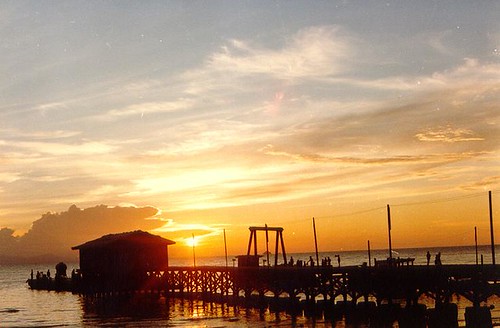 In the afternoon of 30 Tet, in 1978, my wife was in labour. I pretended to be a local villager, taking my wife across the river in a little ferry boat. Even now, 22 years later, I can still see the pickerel weeds floating on the muddy river, images that seemed to represent our situation so closely at that time. After getting off the boat, we walked along the dirt road without daring to ask any pedestrians for directions. I covered my head with a conical hat borrowed from a local villager. I wore a black country shirt and shorts which were faded from being washed so many times in the river. My wife walked heavily ahead and I walked slowly behind her, carrying a rattan basket which was full of baby clothes and supplies. In this way, I took my wife to Rach Gia hospital to register her admission. At that time, the sun was setting.
In the afternoon of 30 Tet, in 1978, my wife was in labour. I pretended to be a local villager, taking my wife across the river in a little ferry boat. Even now, 22 years later, I can still see the pickerel weeds floating on the muddy river, images that seemed to represent our situation so closely at that time. After getting off the boat, we walked along the dirt road without daring to ask any pedestrians for directions. I covered my head with a conical hat borrowed from a local villager. I wore a black country shirt and shorts which were faded from being washed so many times in the river. My wife walked heavily ahead and I walked slowly behind her, carrying a rattan basket which was full of baby clothes and supplies. In this way, I took my wife to Rach Gia hospital to register her admission. At that time, the sun was setting.
“Please follow me and I will show you your bed,” the nurse said, without looking at anyone.
“And you! You can go home now!” she said to me.
I hesitantly walked out of the hospital, without daring to ask any more questions.
“Go home! Go where?” I wondered to myself . It was getting darker. I walked back and forth in front of the hospital and I was so worried, not knowing when my wife would be giving birth to our child. I had heard that the hospital had no doctors and that there were only a few nurses working there. I could see piles of rubbish and soiled clothes from the hospital, which smelled badly. It was late at night and I was impatient, so I went in and quietly opened the door to my wife’s room, hoping to see my wife and our new baby.
“Do you want your wife to die?” a female nurse shouted at me loudly.
I hurriedly closed the door, obedient like a five-year-old child. I did not dare to do anything else, because of my fear that we would be in trouble if they found out about our escape plan! Besides, I had no experience of childbirth. I was so disappointed and continued to walk back and forth in front of the hospital.
Suddenly, I was startled by hearing a baby’s cry. Happily, I ran around the hospital without daring to go inside!
*
Over the next two days, although my wife had many stitches, she was allowed to be discharged. Before leaving, I went through the hospital’s yard to clean up the rubbish and bricks that I had used to cook rice and boil water for my wife and myself. Unlike the trip coming to the hospital, this time I went ahead, joyfully carrying two heavy baskets. My wife slowly walked behind me, cradling Hien gently in her arms. Placing the two baskets on the river bank, I hurriedly helped her to get on the little boat to return to our small ramshackle hut which was across the other side of the river. This hut had been abandoned for a long time – I even had to collect some dried areca trunks which were floating on the river to prevent it from collapsing. The families of Chinese background in our group were willingly supported by the villagers because they had money to pay extra for their shelters. Only my wife and I had to look to ourselves for shelter, because there was no one who wanted to have a pregnant woman in their homes. More than 90% of the villagers were Cantonese speakers of Chinese background. They made a living as coconut and pineapple farmers. Every morning, after going to the field to do my personal hygiene, I ate breakfast which consisted of a ripened pineapple. I didn’t forget to get another one and put it between two dried coconut leaves to take back home for my wife. Those coconut leaves would be used as fuel for cooking in the following days.
To mark the day when Hien was one month old, a friend who once shared meals with us on the trip, came to visit. The only gift that Hien received was his piece of Dove soap!
A few days later, we received the order to leave. That afternoon, I went out to look for the villager who had helped us over the past few months, to give him my pas-de-sous coat and a Zippo lighter which I had brought with me from Saigon. He accepted the gifts and turned his face away without saying anything.
*
In the darkness, I heard only the rush of people preparing to leave.
“Lam Vinh and Ly Hong Nhung!” They were calling our names.
“Yes!” I answered.
I went ahead on a long wooden board which connected the riverbank to the edge of the boat. I was carrying two full baskets. My wife walked behind, cradling Hien on her shoulder. Once on the boat, all luggage had to be stored at the front of the boat. I took my wife to the cabin, and found a spot where I could hang the hammock. This hammock was made by folding a bed sheet eight times, and was placed right above where my wife was sitting. I stood nearby, behind the cabin room.
The engine started, the old boat swaying from side to side and beginning to move forwards. I turned my head to look back to say good bye to my beloved homeland for the last time. I only saw the dark colour of coconut leaves in the thick darkness behind me.
*
For the first two days, everyone on the boat felt safe. Drinking water was stored in a rusty drum and soon there was so little left. We were only given a small handful of rice each, as well as a little cold water on which to survive. I sipped just a little bit of my own drinking water and handed the rest to my wife. Thus, Hien would still have a little “milk” on which to be fed!
On the third day, our boat was robbed twice by Thai pirates. The first time, our wristwatches and wedding rings were stripped away. The second time, they divided us into two groups, one for males and the other for females so that we could be searched for valuable items. After that, we had nothing left to be taken. There was an old man on board, who fainted from fatigue and fear. Although our boat was crowded, we could do nothing to resist the pirates because even a slight hit to the boat would have caused it to immediately capsize.
On the fourth day, everyone was exhausted and spirits were so low because during the previous night, our boat had been towed out to sea by a Malaysian navy ship. From dusk to midnight, they dragged our boat out into deeper waters. We had to cut off their rope to avoid being pulled out even further. After that, we turned our boat around in the hope of finding our way back to shore.
At the end of the boat, there was a poor little toilet with a door which came just halfway up. There were only two small boards put across the hole which we could sit on.
“Where is my mother?” a woman asked from the front of the boat.
“I saw an old woman going into the toilet just a little while before,” a man answered.
The woman pulled the door open, but she could not find anyone. After that, I learned that the old lady had drowned herself through that hole to pray for everyone’s safety. Not long after that, there was a second person who did the same thing. That person was her husband!
On the fifth day, many people on the boat were lying unconscious. No one cared about their trip any more. There was only blue sky and the vast seas around. Everyone just had to trust to fate!
*
“There’s land!” A young man shouted loudly, which made everyone sit up.
Seagulls hovered above our heads, signaling that the coast was not far away. We continued moving. The mist on the horizon began to clear.
“Vinh! Give Hien to me!” A young man told me excitedly.
The boat was speeding towards the coast until everyone fell forward because its bottom hit the sand. The young man put my son in a small yellow bucket. With one hand he lifted it above the water level, while with the other hand, he swam to the shore. I learned later that he used to be a fisherman.
Everyone jumped into the water to swim to shore. Some were supported by others because either they could not swim or they were too weak to swim. I was one of the last ones, because I was at the end of the boat. All of us, both adults and children, a total of 185 people, were “welcomed” by Malaysian police. Later, we were all put together in a primary school, in Nenasi village.
During the first three weeks, we lived in a humble way due to the generosity of some people of Chinese background in the village. The amount of rice we received was only enough to cook as porridge with some other fresh food. We were also given coffee, sugar and milk.
We divided ourselves into small groups to receive the necessities. Later, some acquaintances told me that there were some gangsters in our group and they wondered how we could live with them. I just smiled and didn’t say anything. We cooked our food together until we were officially ordered to move to a concentration camp. In that time, we helped a young pregnant woman named Lan, by accepting her into our family, as she had no relatives to help her and no clothes to change into. She borrowed some of my wife’s clothes when she needed to wash her own. The four of us slept together in a nylon mosquito net that I had found in our basket off the coast. I felt embarrassed once because early in the morning when I woke up, I found myself in the middle, with my wife on one side and Lan on the other.
At the time of leaving the camp of Nenasi to enter the main camp in Cherating, we were all sitting in a mini-van. There was a kind elderly local man who we used to call Hien’s grandfather, because he had secretly brought food to us many times. On the day that we were to leave, he brought us three packets of sticky rice with coconut and beans which were wrapped in a fresh banana leaf. We received those gifts for breakfast without being able to hold back our tears. He also cried and then waved his hand and wiped his eyes, while the mini-van slowly drove away.
*
The first day at Cherating camp, incidentally, I saw a man who I knew when we were living on the island of Tat Cau. He was a single, young and quiet man. We were all sitting together, talking about our past on the island.
“You have very good English skills. You should go out to help people. I am busy with my small child, so I can’t get out,” I told him.
“This land would not be a place where I want to show my English skills,” he answered.
“F… king right here! People who need you, but you don’t help! They would not need your help once they come to a third country!” I thought to myself.
After that, I no longer wanted to see him again.
After nearly three months living at the Cherating camp, we felt settled, being provided with shelter and other necessities. We mentally prepared ourselves in case we needed to live at the camp for a lot longer. During that time, there were quite a few delegations arriving at the camp from countries such as the USA, Canada and New Zealand. Each delegation organized interviews to assist people to resettle to a new country. However, they abandoned their attempts without doing anything because people in the camp hustled each other to get the earlier interviews. This was disrupting the whole camp. When it came to the Australian delegation’s turn, we were not going to bother to attend an interview, because only five people from our boat had been accepted for resettlement in Australia. However, we found ourselves standing in the hot sun, outside the interview hut. I held my son in my arms, his head covered with a dark yellow bath towel, while beside me was Hien’s mother. We were the last ones from the boat.
An Australian official pointed his index finger towards us and swung it back and forth. We stood still because we didn’t understand what he wanted.
“They are inviting you in,” the interpreter explained.
We entered and stood in front of the desk of an Australian official.
“I like your family!” he said to me.
I looked at him without answering because I didn’t believe in my English ability.
“Do you want to go to Australia?” he asked.
“I don’t know, anywhere will do!” I answered, regaining my composure.
He put his hand into a drawer and pulled out two pale green papers and handed them to me.
“Take these home and think about it. Come back again tomorrow!”
*
Time passed quickly and the day finally arrived when we were allowed to leave the camp. The only person who came to the gate to farewell us before we were to be transferred to the transition camp in Kuala Lumpur, was Lan. The doctor in the camp said that it would soon be time for her to give birth. Lan was accepted to go to America with her husband. We waved goodbye to her as we got onto the bus. She turned her face away to hide her tears. The bus slowly moved forwards. I saw Lan still standing there, getting smaller and smaller amongst the crowd.
*
Time has gone by quickly. It has been 21 years living in this new country where our children have grown up. Hien’s 21st birthday was not long ago. Our middle son has studied Year 12 and Yen, our youngest daughter, is in Year 10. They are all very tall. I often tease Hien, telling him that he is tall because his Mum ate lots of pineapple! I have often told them the story of our trip, including the selfishness of that young man. My wife says that our son Kim looks like me – he also likes to do good things for others. I often remind myself that we must try hard to make the former “cluster of pickerel weeds” enrich this land which is our second homeland.
April, 2000
(The above article won its third prize and was read on the SBS radio to commemorate the year of 2000. The following piece is written to update our family situation to meet the requirement of the VN Boat People project)
I have been living in Australia almost 41 years now – that’s longer than the time that I lived in my birthplace. It seems that we have all been trying hard to support our family and to integrate into this new country. Certainly, none of us know what we will be like in the future – for us, we desire nothing more than a peaceful life for our family, our friends, our loved ones and of course, for the whole of Australia as well. With me, a strong belief always reminds me that we should try our best to work for ourselves, for our family and for society – happiness can come to us unexpectedly without ever letting us know in advance!
I remember, when I was watching the 2000 Olympics held in Sydney, on television, I shed tears of joy when Keiran Perkins swam past his opponent to win a gold medal for the long distance swimming event. I know that I have been a part of this beloved country, because I feel I am happy with what it achieves and sad for what has been lost! So are our children who, in their temperament, are quite similar to their parents. They have tried to work hard to serve their families and their homeland, within their abilities and beyond our expectations. The eldest child is now an oncologist and also an Associate Professor, the second son is a pediatric psychiatrist – specialising in children addicted to computer games. He has often organised and participated in charitable programs related to his profession. The youngest daughter is settled in her online business with her husband and also takes care of their cute children.
Perhaps, a simple thank you to Australia would not be enough, but we all need to take action, because it has opened its arms to save many unfortunate lives over the past many decades. As mentioned above, we have tried our best, so that the former cluster of pickerel weeds could help to enrich the land of this beloved country.
Vinh Van Le, Nov. 2019
Related Articles
The girls, the girls! Hide the girls!
We were old enough to hide ourselves, and we jumped up at once and scrambled to a place where they could not see us. There were two of them, and through my seven-year-old eyes I could see they were armed with swords that gleamed mercilessly in the sun as they jumped onto our boat…
Live to Tell Our Tale
Since escaping Vietnam 25 years ago, my mind has constantly wandered back to two sisters – two of a dozen on my boat who were raped, tortured and stripped of their dignity. As a young man, I had never felt so helpless. I often wonder if those women have been able to get on with life.
My Mother
After the fall of Saigon, things changed drastically for our family under the communist regime. Wanting a better life for their children, my parents decided we would escape from Vietnam by boat, but not all together.
I Was Sixteen and I Was Lost
By: Lala Stein I had in my possession a little bag filled with memories and hopes. I was heading south, to Chau Doc, in the company of a small group of people with the same purpose: we were seeking freedom. After about a week in Chau Doc we managed to get on a ferry...
My Journey
By: Don Thu Nguyen When the communists took over South Vietnam I had just graduated from the military officer training school. Because I had not served in the military I was spared from going to re-education camp, but my background meant I had no chance of securing a...
My Children
By: Lyma’s mother For six months I lived on one bowl of salty rice a day. I was a prisoner, jailed because some policemen concluded I was a CIA agent because they found a photograph of me with an American. I explained that he had been my English teacher, and the photo...
The Endless Journey of An Exile
After the incident in 1975, there was a strong cross-border wave in Vietnam. There were many escapees who crossed the border by sea or by land, but the most common means of transportation was by sea…
Vietnamese Boat People in Australia
In April 1975, the North Vietnam Communist Government invaded South Vietnam. The Southern Vietnamese people could not live under the Communist regime so they later found their way for freedom…
Goodbye Grandma
Poor Grandma, she’d made the boat journey but could not survive once she got to the island. I carried her once more, this time to the jungle to bury her. She’d known that she might not make it…
SOS! You and God save us
When I recall the tragic refugee stories of danger, death, piracy, rape and loss of money, my heart is broken still. But on the other hand I had a happy time working with the unaccompanied minors, and a very meaningful time.…
